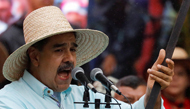Writer Without Borders, Trailing Migrants
HOLTVILLE, California - William T. Vollmann, legendarily prolific, has written nine novels, including “Europe Central,” which won the National Book Award in 2005; a seven-volume, 3,000-page history of violence; and a book about hopping freight trains, a hobby of his even though his balance is so bad that he has to use a bucket as a stepstool.
His newest book, “Imperial,” released by Viking Press in July, is 1,300 pages long and took him 12 years to write. Its two great themes are illegal immigration - the struggle of thousands of Mexicans to sneak into the United States through California’s Imperial Valley - and water, which has transformed parts of the valley from desert to seeming paradise but at great environmental cost.
A companion volume, published by powerHouse Books, contains some 200 photographs he took while working on “Imperial,” for which he also wore a spy camera while trying to infiltrate a Mexican factory, and paddled in an inflatable raft down the New River in California, a rancid trench that is probably the most polluted stream in America.
Mr. Vollmann, who just turned 50, is reclusive, despite being married and the father of a daughter, and oldfashioned: a wandering, try-anything writer-journalist in the tradition of Steinbeck or Jack London.
Mr. Vollmann collects pistols and likes to shoot them. To research his novel “The Rifles,” he spent two weeks alone at the magnetic North Pole, where he suffered frostbite. He has traveled to Thailand, Bosnia, Somalia, Russia, Afghanistan and Iraq, among other places, studying war and poverty, and has a habit of picking up prostitutes just about wherever he goes. He has spent considerable time with skinheads, alcoholics and crack addicts, and has ingested plenty of illegal substances himself.
“Crack,” he said recently, “is a really great drug - it’s like having three cups of coffee at once.”
“Imperial,” which is about the vast and arid region in the southeastern part of California, bordering Mexico, is an extreme Vollmann production: brilliant in places, nearly unreadable in others. There are lyrical passages, and labyrinthine ones along with scientific chapters, complete with graphs, on salinization and agricultural productivity.
The more interesting stuff includes chapters on narco-ballads - songs, outlawed in Mexico, celebrating drug lords - on early California history, on the Chinese-dug tunnels in Mexicali and on Mr. Vollmann’s lingering breakup with an old lover.
On a cloudless, sunbaked summer day, Mr. Vollmann toured some of the landscapes that had inspired him. “I used to think the Imperial Valley was hot, flat and boring,” he explained. “But I crossed over here, stayed in a hotel and realized the place was full of secrets.”
At one point he peered through the Mexican side of the border fence. “I think countries have the right to maintain their borders,” he said, “but on the other hand, think of the thousands or so who have died just trying to get to the United States so they can clean toilets. It seems horrendous that they shouldn’t have a better life, especially if they’re willing to do work we aren’t.”
He visited the Terrace Park Cemetery here in Holtville, where unidentified people who have died crossing the border are buried in a bare field.
Mr. Vollmann stood there quietly for a while and said, “You wonder how many are never found and never brought here,” and he added, an edge of sarcasm creeping into his voice: “At least they won’t be stealing our tax dollars anymore. That’s very important.”
스마터리빙
more [ 건강]
[ 건강]이제 혈관 건강도 챙기자!
[현대해운]우리 눈에 보이지 않기 때문에 혈관 건강을 챙기는 것은 결코 쉽지 않은데요. 여러분은 혈관 건강을 유지하기 위해 어떤 노력을 하시나요?
 [ 건강]
[ 건강]내 몸이 건강해지는 과일궁합
 [ 라이프]
[ 라이프]벌레야 물럿거라! 천연 해충제 만들기
 [ 건강]
[ 건강]혈압 낮추는데 좋은 식품
[현대해운]혈관 건강은 주로 노화가 진행되면서 지켜야 할 문제라고 인식되어 왔습니다. 최근 생활 패턴과 식생활의 변화로 혈관의 노화 진행이 빨라지고
사람·사람들
more많이 본 기사
- “헉, AI가 만든 사진일 줄”…발등에 ‘귀’ 달고 다닌 30대 中 여성, 도대체 왜?
- “20분이면 샤워·건조까지 풀코스로”…상상 속 ‘인간 세탁기’ 드디어 첫 가동, 가격 보니
- 이란, 노벨평화상 수상자 모하마디 또 체포… “불법 구호 외쳐”
- 민주, 트럼프와 여성들 함께 찍힌 ‘엡스타인 사진’ 공개…엡스타인 저택서 확보한 19장에 빌 클린턴·빌 게이츠 등 유명 인사
- “’삐빅’ 비트코인으로 결제할게요”…맥도날드·편의점서도 쓴다는 ‘이곳’, 어디?
- 19개주, 트럼프 전문직 비자 ‘10만불 수수료’에 소송
- 트럼프, 새 연준의장 2파전 시사… “워시와 해싯 둘 다 훌륭”
- 젤렌스키 측근 협상가가 FBI국장을 왜?…비밀회동 목적 의문
- “산타 분장하고 아이들과 만났는데”…교사 출신 60대 남성, 성범죄 혐의에 美 ‘발칵’
- “머스크의 X, 3분기 매출 7억 달러대…순손실 5억 달러대”
- 미네소타 보조금 사기, 안보 문제로 비화…월즈 ‘곤혹’
- “말이 참 기십니다”…李대통령, ‘尹… 1
- 뉴욕증시, 브로드컴 비관론에 AI 테마 ‘와르르’…나스닥 1.7%↓ 마감
- ‘양육비 미지급’ 김동성 “내가 月700만원? 통장 압류된 신용불량자”
- 워싱턴주 홍수로 수만명 대피…주지사 “유례없는 상황 직면”
- 쿠팡 美소송 신청자, 나흘 만에 2000명 이상 증가… “연내 소장 제출”
- 초강경 추방 드라이브… 한인사회 불안… 5
- [송년행사 화보] “친구야 반갑다… 선배님들 모두 건강하세요”
- ‘나혼산’ 박나래, 흔적도 없이 하차… 1
- “엔비디아, 中수요 반영 H200 증산”…일각선 “中, 수입거부할듯”
- 노화의 신호, 흰머리는 왜 생기나… … 2
- 김지민 “유부남과 불륜, 날 알리바이로 이용”..친구와 손절한 사연 [이호선의 사이다]
- FDA, 우울증 치료 ‘뇌 자극’ 가정용 헤드셋 기기 첫 승인
- 美 레전드 깜짝 전망 “한국, 북중미 월드컵 A조 1위로 32강”
- 소셜연금 NY 2,018달러·NJ 2,190달러
- [전문가 칼럼] 심장질환의 새로운 위험원인 발견
- 22기 LA평통 출범에 거는 기대
- 우크라 “러 점령 쿠피안스크 일부 탈환”…젤렌스키 방문
- 이민자 추방 전용기 6대 구매 불체자 100만명 추방 속도전
- 한인 업소들, 이번 주말 ‘할인 대전’ 돌입
- 양로원 한인노인들에 온정 전해
- 트럼프 “태국·캄보디아, 교전 중단하고 평화협정 복귀 합의”
- 정준호 얼굴 훔쳐 가짜 광고..소속사 “악의적 행위, 법적 대응”
- 글로벌어린이재단 VA 지부, 2.20 클럽에 2,000달러 기부
- ‘오바마케어 보조금’ 올해 말 종료 가능성 ↑ 커져
- 에어프레미아, 워싱턴 DC 신규 취항
- “멍청한 이민국” 트럼프 비판에… 미, 비자 개선 속도전
- 美지상작전 임박설 속 베네수 이민자 송환 중단 놓고 ‘혼선’
- 김하성-ATL, 이대로 헤어지나→윈터미팅서만 무려 1005억 지출해버렸다
- 美, 친트럼프 보우소나루 재판한 브라질 대법관 제재 해제
- ‘정국 열애설’에 뿔난 아미 ‘워워’..BTS 완전체, 전역→웃으며 연습실 회동 첫 인증샷
- 돌고래는 탐색, 범고래는 사냥…연어잡이에 놀라운 전략적 동맹
- 초강경 추방 드라이브… 한인사회 불안감 확산
- 월마트도 나스닥 이전… 기술기업 변신
- 역사보존단체, 백악관 일부 허문 ‘트럼프 연회장’ 저지 소송
- ‘트럼프가 석방 요구’ 홍콩 반중 언론인 지미 라이 15일 선고
- 한국 교사 10명, 페어팩스 초등교 배치
- ‘오락가락’ 진술 윤영호…경찰 수사 첫 스텝부터 꼬이나
- ‘강등’ 검사장 정유미, 인사취소 소송… “인사껍질만 쓴 중징계”
- 무단 주차 견인료 150불⇨ 210불
1/5지식톡

-
 테슬라 자동차 시트커버 장착
0
테슬라 자동차 시트커버 장착
0테슬라 시트커버, 사놓고 아직 못 씌우셨죠?장착이 생각보다 쉽지 않습니다.20년 경력 전문가에게 맡기세요 — 깔끔하고 딱 맞게 장착해드립니다!장착비용:앞좌석: $40뒷좌석: $60앞·뒷좌석 …
-
 식당용 부탄가스
0
식당용 부탄가스
0식당용 부탄가스 홀세일 합니다 로스앤젤레스 다운타운 픽업 가능 안녕 하세요?강아지 & 고양이 모든 애완동물 / 반려동물 식품 & 모든 애완동물/반려동물 관련 제품들 전문적으로 홀세일/취급하는 회사 입니다 100% …
-
 ACSL 국제 컴퓨터 과학 대회, …
0
ACSL 국제 컴퓨터 과학 대회, …
0웹사이트 : www.eduspot.co.kr 카카오톡 상담하기 : https://pf.kakao.com/_BEQWxb블로그 : https://blog.naver.com/eduspotmain안녕하세요, 에듀스팟입니다…
-
 바디프렌드 안마의자 창고 리퍼브 세…
0
바디프렌드 안마의자 창고 리퍼브 세…
0거의 새제품급 리퍼브 안마의자 대방출 한다고 합니다!8월 23일(토)…24일(일) 단 이틀!특가 판매가Famille: $500 ~ $1,000Falcon: $1,500 ~ $2,500픽업 & 배송직접 픽업 가능LA…
-
 바디프렌드 안마의자 창고 리퍼브 세…
0
바디프렌드 안마의자 창고 리퍼브 세…
0거의 새제품급 리퍼브 안마의자 대방출 한다고 합니다!8월 23일(토)…24일(일) 단 이틀!특가 판매가Famille: $500 ~ $1,000Falcon: $1,500 ~ $2,500픽업 & 배송직접 픽업 가능LA…
케이타운 1번가
오피니언

22기 LA평통 출범에 거는 기대

연말 시즌 사기·범죄 경계해야
 메건 매카들 워싱턴포스트 칼럼니스트
메건 매카들 워싱턴포스트 칼럼니스트 [메건 매카들 칼럼] 장편영화의 마지막 챕터인가
 김미선 서북미문인협회 회장시인
김미선 서북미문인협회 회장시인 [한국춘추] 하늘을 계산한 사람들, 칠정산
 이희숙 시인·수필가
이희숙 시인·수필가 [금요단상] 그을린 자리에서 다시
 심상용 / 서울대 미술관장
심상용 / 서울대 미술관장 [미술 다시보기] 지옥에 대하여
 서정명 / 서울경제 기자
서정명 / 서울경제 기자[만화경] 주한미군과 ‘도련선 리스크’
 한 영 재미수필가협회 회장
한 영 재미수필가협회 회장 [한영의 독서칼럼] 불안한 사람들
 정영현 서울경제 테크성장부장
정영현 서울경제 테크성장부장 [여명] 콘크리트가 데이터가 됐을 뿐, 달라진 게 없다
1/3지사별 뉴스

“마약밀매·인신매매 등 국제범죄 척결” ‘국토안보 태스크포스’ 뉴욕지부 출범
연방 국토안보부가 10일 ‘국토안보 태스크포스’(HSTF) 뉴욕지부를 출범시켰다.HSTF는 마약 카르텔, 인신매매, 자금세탁, 갱단 등 국제범…
‘오바마케어 보조금’ 올해 말 종료 가능성 ↑ 커져

한국 교사 10명, 페어팩스 초등교 배치
‘글로벌 앰버서더 티처스 프로그램’(Global Ambassador Teachers Program)은 국제 교사 교환 프로그램 가운데 하나로 …
김찬수씨, 포토맥 포럼에 2천달러 기부

초강경 추방 드라이브… 한인사회 불안감 확산
도널드 트럼프 행정부가 출범 직후 불법체류자 100만 명 추방 목표 달성을 위해 초강경 조치를 본격화하면서 미주 한인사회에 불안감이 심각하게 …
SV 한인대상 시상식

오늘 하루 이 창 열지 않음 닫기 























































.png)


댓글 안에 당신의 성숙함도 담아 주세요.
'오늘의 한마디'는 기사에 대하여 자신의 생각을 말하고 남의 생각을 들으며 서로 다양한 의견을 나누는 공간입니다. 그러나 간혹 불건전한 내용을 올리시는 분들이 계셔서 건전한 인터넷문화 정착을 위해 아래와 같은 운영원칙을 적용합니다.
자체 모니터링을 통해 아래에 해당하는 내용이 포함된 댓글이 발견되면 예고없이 삭제 조치를 하겠습니다.
불건전한 댓글을 올리거나, 이름에 비속어 및 상대방의 불쾌감을 주는 단어를 사용, 유명인 또는 특정 일반인을 사칭하는 경우 이용에 대한 차단 제재를 받을 수 있습니다. 차단될 경우, 일주일간 댓글을 달수 없게 됩니다.
명예훼손, 개인정보 유출, 욕설 등 법률에 위반되는 댓글은 관계 법령에 의거 민형사상 처벌을 받을 수 있으니 이용에 주의를 부탁드립니다.
Close
x